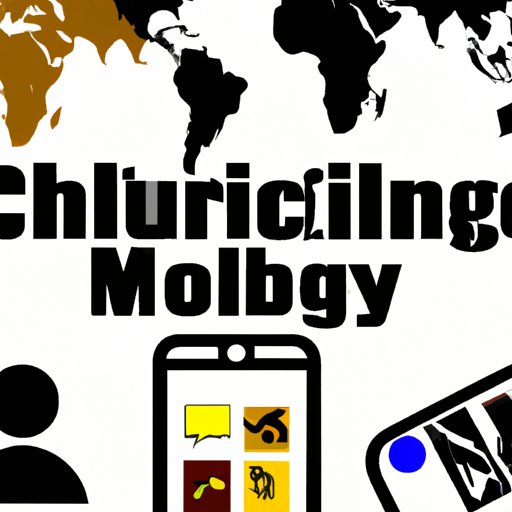Introduction
Culture is a broad concept that encompasses many aspects of life. It includes shared values, beliefs, customs, traditions, language, and other forms of communication. As such, it can be difficult to define and even more difficult to track its evolution over time. This article will explore the various factors that contribute to the changing nature of culture, including technology, globalization, history, migration, and social media.
Exploring the Role of Technology in Cultural Change
Technology has had a profound impact on culture. In particular, it has enabled increased interaction between people from different parts of the world. People are now able to connect with one another across vast distances in ways that were unimaginable a few decades ago. This has allowed for the sharing of ideas and cultural influences on a global scale.
The impact of technology on traditional practices is also evident. For example, the development of the internet and mobile phones has changed the way people communicate, shop, and do business. Furthermore, advances in computing power have enabled people to access information and resources that were once out of reach. This has resulted in a shift in cultural values and norms.
Examples of technology’s influence on cultural change can be seen in the rise of social media platforms such as Facebook and Twitter. These sites have enabled users to share their opinions, experiences, and views with a much wider audience than ever before. This has had a significant impact on public discourse and the way people interact with each other.

Examining How Globalization Has Impacted Cultural Change
Globalization refers to the process of increasing interconnectedness between countries and regions around the world. This has led to an increase in the exchange of goods, services, and ideas between different cultures. As a result, cultures are becoming increasingly homogenized and there is a greater level of cultural exchange taking place.
The impact of globalization on cultural exchange is evident in the spread of popular music, films, and television shows. These forms of entertainment are now widely available across the globe, allowing for the sharing of cultural values and norms. In addition, the availability of international travel has made it easier for people to visit different countries and experience different cultures firsthand.
Examples of cultural change due to globalization can be seen in the increasing number of multinational corporations operating in different countries. These companies often adopt certain cultural values and norms in order to appeal to a global market. This has resulted in the emergence of a global consumer culture that is marked by a shared set of values and beliefs.

Analyzing Historical Examples of Cultural Change
To better understand how culture changes over time, it is important to examine historical examples of cultural change. Pre-industrial societies were largely isolated from one another and had limited contact with other cultures. As a result, each society developed its own unique set of values and beliefs.
Industrialization brought about sweeping changes in the way people lived and worked. It also facilitated increased contact between different cultures, resulting in the sharing of ideas and practices. This had a profound effect on cultural values and norms, leading to a greater level of homogeneity among different societies.
Post-industrialization has further accelerated the process of cultural exchange. The increased availability of international travel and communication technologies has enabled people to experience different cultures firsthand. This has led to a greater level of understanding and appreciation for cultural diversity.
Investigating the Influence of Migration on Cultural Change
Migration has long been a driving force behind cultural change. People who move to different countries often bring with them their own set of values and beliefs. These can then be shared with the local population, resulting in a blending of cultures. This is particularly evident in cities, where different cultures often interact and influence one another.
The role of migration in cultural exchange is also evident in the increasing number of refugees and immigrants around the world. These individuals often bring with them their own unique set of values and beliefs, which can then be shared with their host country. This has resulted in a greater level of cultural understanding and appreciation.
Examples of migration and its impact on culture can be seen in the United States. The influx of immigrants from all over the world has resulted in a rich mix of cultures and traditions. This has had a significant impact on the national identity, leading to a greater acceptance of cultural diversity and tolerance of different beliefs.

Assessing the Effects of Social Media on Cultural Change
Social media has had a profound impact on culture. It has changed the way people communicate, allowing them to share their thoughts and experiences with a much wider audience than ever before. This has resulted in a greater level of public discourse, with people debating topics and exchanging ideas on a global scale.
The impact of social media on cultural exchange is evident in the increasing number of online communities that have emerged in recent years. These communities are often characterized by a shared set of values and beliefs, which can then be shared with a global audience. This has enabled people to connect with one another in ways that were previously impossible.
Examples of social media influencing cultural change can be seen in the spread of certain trends and fads. For example, the popularity of certain fashion styles or types of music can be traced back to the influence of social media. This demonstrates the power of social media to shape cultural values and norms.
Examining the Impact of Politics on Cultural Change
Politics also plays an important role in shaping cultural values and norms. Governments can use laws, regulations, and policies to promote certain values and discourage others. This can have a profound effect on the way people think and behave, resulting in a shift in cultural values and beliefs.
Examples of political decisions impacting cultural change can be seen in the legalization of same-sex marriage in many countries. This decision was driven by the desire to promote greater acceptance of LGBT rights, which has had a significant impact on public attitudes towards the issue. Similarly, bans on the sale of certain products or services can also have an impact on cultural values.
Conclusion
In conclusion, culture is constantly evolving and changing. This is due to a variety of factors, including technology, globalization, history, migration, and social media. Each of these influences can have a profound effect on the way people think and act, resulting in a shift in cultural values and norms. Understanding how culture changes over time is essential for appreciating the diversity of the world today.
This article has explored how culture changes over time, looking at the role of technology, globalization, history, migration, and social media in influencing cultural exchange. It has shown that each of these factors can have a significant impact on the way people think and behave, resulting in a shift in cultural values and norms.
The implications of this are far-reaching. A better understanding of how culture changes over time can help us to appreciate the diversity of the world today and foster greater understanding and respect between different cultures.
(Note: Is this article not meeting your expectations? Do you have knowledge or insights to share? Unlock new opportunities and expand your reach by joining our authors team. Click Registration to join us and share your expertise with our readers.)
